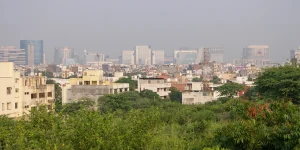The real estate market in Gurgaon has always been influenced by government policies, taxation reforms, and infrastructure development. One of the most significant factors shaping property transactions in recent years has been the Goods and Services Tax (GST).
Table of Contents
With the new GST update in 2025, many homebuyers, investors, and developers are trying to understand how these changes will impact stamp duty, registration charges, and property taxes—the unavoidable costs associated with buying property in Gurgaon.
In this blog, we’ll break down everything you need to know about the latest GST reforms and their implications for property ownership in Gurgaon.
Understanding GST in Real Estate
Before diving into the impact, let’s clarify the role of GST in real estate transactions:
- Under-Construction Property: GST applies to under-construction flats, apartments, and commercial units.
- Ready-to-Move-In Property: GST does not apply to completed projects with an occupancy certificate.
- Affordable Housing: Reduced GST rates are applicable for affordable housing projects.
- Luxury Housing: Higher GST slabs are applicable for premium and luxury homes.
However, stamp duty, registration fees, and property taxes are separate from GST and are levied by the state government. The 2025 GST update aims to simplify tax compliance and reduce overlapping charges, making property transactions more transparent.
Stamp Duty and Registration in Gurgaon
When purchasing a property in Gurgaon, buyers must pay:
- Stamp Duty:
- Charged as a percentage of the property’s value, varying between 5% to 7% in Haryana (with differences based on gender and location).
- It is mandatory for validating property ownership.
- Registration Charges:
- A fixed cost (generally 1% of property value) paid to legally register the property in the buyer’s name.
Key Point: GST does not replace stamp duty or registration charges. These remain payable separately.
Property Taxes in Gurgaon
Property tax in Gurgaon is collected annually by the Municipal Corporation of Gurugram (MCG). It depends on factors such as:
- Size of property
- Location (urban vs. rural)
- Usage (residential vs. commercial)
- Type of property (independent floor, flat, builder floor, plot, etc.)
The new GST update doesn’t directly alter property tax, but it may influence collection methods, compliance, and clarity.
GST Update 2025: What Changed?
The 2025 GST reform focuses on:
- Clarity on Double Taxation
- Earlier, many buyers were confused about paying GST + Stamp Duty + Registration. The update makes it clear that these are separate charges and ensures no overlapping taxation.
- Earlier, many buyers were confused about paying GST + Stamp Duty + Registration. The update makes it clear that these are separate charges and ensures no overlapping taxation.
- Input Tax Credit (ITC) Adjustments
- Developers can now claim streamlined ITC benefits, which may reduce construction costs. Ideally, this benefit should pass on to buyers, making under-construction flats cheaper.
- Developers can now claim streamlined ITC benefits, which may reduce construction costs. Ideally, this benefit should pass on to buyers, making under-construction flats cheaper.
- Affordable Housing Incentives
- GST on affordable housing projects remains low, encouraging first-time buyers. Gurgaon’s emerging sectors (78, 84, 85, 89) benefit from this update.
- GST on affordable housing projects remains low, encouraging first-time buyers. Gurgaon’s emerging sectors (78, 84, 85, 89) benefit from this update.
- Luxury Segment Impact
- Luxury homes may see a marginal price increase due to reduced ITC availability, but the effect on overall cost remains moderate.
Impact on Stamp Duty in Gurgaon
- No Elimination of Stamp Duty: GST reform doesn’t remove stamp duty since it is a state subject. Buyers in Gurgaon will still pay 5–7% stamp duty.
- Possible Rationalization: With GST updates simplifying property taxation, experts expect Haryana may rationalize stamp duty rates in future to attract more buyers.
- Clarity in Transactions: The update reduces confusion about GST applicability, making stamp duty calculations straightforward for buyers.
Impact on Registration Charges
- Registration Fees Unaffected: Registration continues to be levied at 1% of property value in Gurgaon.
- Digital Registrations: The GST reform complements Haryana’s move towards online property registration, making the process more transparent and hassle-free.
- No Double Taxation: Buyers will not face overlapping charges, as GST doesn’t replace registration costs.
Impact on Property Taxes in Gurgaon
While GST doesn’t directly change property tax, the update has indirect effects:
- Better Compliance: With a unified tax structure, MCG may integrate GST-linked data for more accurate property tax assessments.
- Ease of Payment: Buyers may soon enjoy digital payment platforms linking GST and property tax records.
- Transparency: Developers declaring GST-compliant records will help MCG in identifying taxable properties more efficiently.
Buyer’s Perspective: What This Means in 2025
For a homebuyer in Gurgaon, the 2025 GST update has the following implications:
- Under-Construction Buyers: Can expect more transparency in pricing. Developers may pass on ITC benefits, reducing costs.
- Ready-to-Move Buyers: No GST applies, but stamp duty and registration charges remain.
- First-Time Buyers: Luxury housing continues to benefit from reduced GST, making projects like Ganga Liv89 and Nandaka 84 attractive.
- Luxury Buyers: Slight cost adjustments, but premium projects like Ganga Valley 78 still offer long-term investment value.
Developer’s Perspective: How GST Reform Impacts Builders
For developers like Ganga Realty, the 2025 GST update is a mixed bag:
- Pros:
- Streamlined ITC improves cash flow.
- Transparency builds buyer trust.
- Affordable housing demand gets a boost.
- Challenges:
- Reduced ITC in luxury projects could pressure pricing.
- Developers must ensure strict GST compliance in billing and invoicing.
Overall, this reform encourages organized players like Ganga Realty to thrive, while discouraging smaller unorganized developers.
Gurgaon Real Estate Outlook Post-GST Update
With clarity on GST, stamp duty, and registration, Gurgaon’s real estate market looks stronger in 2025:
- Affordable Housing Growth: Areas like Sector 84, 85, and 89 will see rising demand due to lower GST rates.
- Luxury Market Stability: Premium sectors (Golf Course Extension, Sector 78) remain attractive for NRIs and high-net-worth individuals.
- Buyer Confidence: Transparent taxation reduces hidden costs and boosts confidence in Gurgaon’s residential market.
Quick Comparison Table – GST Old vs New
| Aspect | Old Regime (Pre-2019) | New Regime (2019 Onwards, 2025 Updates) |
|---|---|---|
| Residential Rate | 12% with ITC | 5% without ITC (1% affordable) |
| Input Costs | Higher (28% on cement) | Lower (18% or 5% on materials) |
| Buyer Impact | Higher effective cost | 3-5% savings on property price |
| Developer Benefit | ITC claim | No ITC, but lower input tax |
| Slabs | Multiple (5,12,18,28) | Simplified (5,18,40 de-merit) |
Conclusion
The GST Update 2025 doesn’t overhaul the entire real estate tax regime but brings much-needed clarity and rationalization. For Gurgaon, where property investments are booming, this means:
- Buyers know exactly what they’re paying for.
- Developers have more tax efficiency and transparency.
- Affordable housing continues to be encouraged, while luxury and commercial projects gain competitive pricing.
Also Read:- Complete Guide to Buying a Property in Gurugram
FAQs on GST, Stamp Duty & Property Taxes in Gurgaon (2025)
Q2. Is GST applicable on ready-to-move flats in Gurgaon?
No, GST applies only to under-construction properties. Ready-to-move flats with occupancy certificates are exempt
Q3. How does GST update affect luxury housing in Gurgaon?
Luxury housing continues to enjoy a lower GST rate, making projects like Ganga kashi more accessible.
Q4. Are property taxes in Gurgaon affected by GST?
Directly, no. But GST reforms may streamline compliance and digital payment systems for property taxes in the future.
Q5. Which Ganga Realty projects benefit most from GST updates?
Ganga Kahi (Sector 89): Luxury, low GST impact.
Nandaka 84 & Anantam 85: Luxury housing ideal for couples and families.
Ganga Valley 78: Luxury living with transparent pricing.








